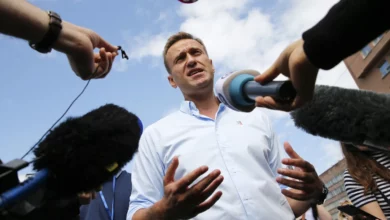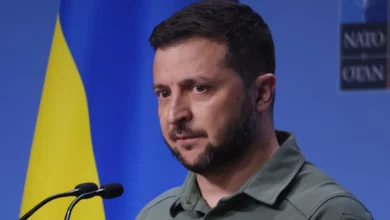A Ukrainian court on Tuesday sentenced former prime minister Yulia Tymoshenko to seven years in prison for abuse of office in relation to a 2009 gas deal with Russia that she brokered, a case regarded widely in the West as politically orchestrated.
Judge Rodion Kireyev handed down the sentence – the maximum sought by state prosecutors – at the end of a three-month trial that has polarized society in the ex-Soviet republic and risks undermining Ukraine's relations with the West.
"The court has … found Tymoshenko guilty… and sentenced her to a prison term of seven years," he said. Her lawyers said they would appeal against the verdict.
The European Union, a major trading partner for Ukraine, immediately denounced the judgment as politically motivated and told President Viktor Yanukovich's leadership that it would boomerang seriously against relations.
"The way the Ukrainian authorities will generally respect universal values and rule of law, and specifically how they will handle these cases, risks having profound implications for the EU-Ukraine bilateral relationship," EU foreign policy chief Catherine Ashton said in a statement on behalf of the bloc.
This included "the conclusion of the Association Agreement, our political dialogue and our cooperation more broadly," the statement issued in Brussels said.
Her supporters say Yanukovich wants to neutralize her as a political force before next year's parliamentary election.
The EU had earlier warned that jailing the charismatic Ukrainian opposition leader will jeopardize ratification of the agreement, which entails the creation of a free trade zone and is due to be signed later this year.
Tymoshenko, 50, who described the trial as a "lynching" organized by Yanukovich and denied any wrongdoing in negotiating the 2009 deal, smiled faintly as the sentence was pronounced.
But the former Orange Revolution leader then rose to her feet and – even as Kireyev continued in a monotone to deliver the rest of his judgment – denounced Ukraine's "authoritarian regime" and decried the lack of justice under Yanukovich.
Kireyev said that she had exceeded her powers by stampeding the state energy concern Naftogaz into signing a 10-year gas supply contract with Russia that resulted in Ukraine paying an exorbitant price for gas.
"In January 2009, Tymoshenko Yu. V., exercising the duties of prime minister … used her powers for criminal ends and, acting deliberately, carried out actions … which led to heavy consequences," he said.
Her actions had led to a loss for Naftogaz of 1.5 billion hryvnias ($188 million), he said.
Supporters, scuffles
Though Russia has rejected charges by the Yanukovich leadership that the deal was improperly negotiated, it is again talking with Ukraine about its terms. The Kiev government says it hopes a new contract will be tied up by the end of the year.
The deal struck between Ukraine and Russia in 2009 was greeted with relief by the EU since it ended a pricing dispute that led to disruptions in gas supplies to parts of the bloc.
At least 2000 Tymoshenko supporters massed outside the courtroom in Kiev city center to hear the verdict, shouting words of encouragement and waving flags in solidarity with her.
When the verdict was pronounced, there were scuffles with police, but no serious clashes. Tymoshenko was driven away in a police van within minutes of the trial ending.
At the start of the day, Tymoshenko, wearing her trademark peasant hairbraid, bristled defiance. Flanked by her daughter, Yevhenia, and husband, Oleksander, in court, she told reporters: "You know very well that the sentence is not being pronounced by Judge Kireyev but by President Yanukovich.
"Whatever the sentence pronounced, my struggle will continue. This sentence, written by Yanukovich, will not change anything in my life or in my struggle."
Opponents, police
Apart from Tymoshenko supporters, scores of riot police and crowds of anti-Tymoshenko demonstrators who turned out at the behest of the ruling Regions Party gathered outside the court for the end of a trial which kept political tension high throughout the summer in Ukraine.
When the judge late last month called an adjournment until Tuesday it was widely seen as a strategic pause to give Yanukovich and his advisers time to consider their options in the face of the Western criticism. He has maintained that her prosecution is a matter for the courts.
EU diplomats had urged Yanukovich to use his powers to "decriminalize" the charge against her – reclassifying it as an administrative rather than an criminal offence – to allow her to go free. But on the eve of the trial resuming there was no sign of a move in this direction.
She and Yanukovich have been at each other's throats since 2004 when Tymoshenko used her PR savvy and rhetoric as a leader of the "Orange Revolution" uprising to doom his first bid for the presidency, with mass protests leading to a court ruling that overturned his fraud-marred election victory.
She went on to hold the post of prime minister twice under then-President Viktor Yushchenko, who gave evidence against her at her trial after they had a bitter falling-out.
The election run-off between Yanukovich and Tymoshenko was a particularly bitter affair and she refused to recognize his victory for weeks. She stepped down finally as prime minister, but has continued to heap scorn on his leadership and on the wealthy industrialists who support him.




